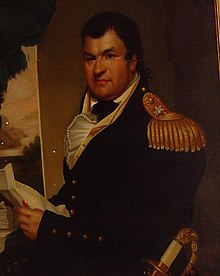Duncan McArthur
| Duncan McArthur | |
|---|---|
 |
|
| 11th Governor of Ohio | |
|
In office December 18, 1830 – December 7, 1832 |
|
| Preceded by | Allen Trimble |
| Succeeded by | Robert Lucas |
| Member of the U.S. House of Representatives from Ohio's 6th district |
|
|
In office March 4, 1823 – March 3, 1825 |
|
| Preceded by | John Sloane |
| Succeeded by | John Thomson |
| Member of the Ohio Senate from Ross, Franklin and Highland counties | |
|
In office 1805-1813 1821-1823 |
|
| Preceded by | Abraham Claypool Joseph Kerr |
| Succeeded by | William Creighton, Sr. James Dunlap (1805-1813) David Crouse (1821-1823) |
| Member of the Ohio House of Representatives from Ross and Franklin counties | |
|
In office 1804-1805 1815-1816 1817-1818 |
|
| Personal details | |
| Born |
June 14, 1772 Dutchess County, New York |
| Died | April 29, 1839 (aged 66) Fruit Hill, Chillicothe, Ohio |
| Resting place | Grandview Cemetery |
| Political party | |
| Signature | |
| Military service | |
| Allegiance |
|
| Service/branch |
|
| Years of service | 1812 - 1815 |
| Rank | Brigadier general |
| Commands | Army of the Northwest |
| Battles/wars | War of 1812 |
Duncan McArthur (June 14, 1772 – April 29, 1839) was a military officer and a Federalist and National Republican politician from Ohio. He served as the 11th Governor of Ohio.
When first elected to state office as a representative, he was serving in the state militia during the War of 1812. He was later appointed as Brigadier General in the U.S. Army and commanded a brigade under General William Henry Harrison during the battle of the Thames. Shortly thereafter he was placed in charge of the Army of the Northwest, serving through 1817 and negotiating the Treaty of Fort Meigs of 1817 to ratify peace and land cessions with Native American tribes.
Born to Scottish immigrants in Dutchess County, New York, McArthur grew up in western Pennsylvania and later moved to Kentucky, where he was employed as an Indian ranger.
McArthur obtained a position with Nathaniel Massie in 1793, and worked with Massie on a surveying expedition in the Northwest Territory. In 1796, he worked with Massie to lay out the new town of Chillicothe, Ohio, which was to become the state capital in 1803. McArthur moved across the Ohio River in 1797 to Chillicothe, where he gained wealth by his land speculations in the Northwest Territory.
McArthur was elected to the United States House of Representatives from Ohio's 3rd congressional district while serving in the state militia during the War of 1812. He never qualified for office as he preferred to continue serving in the military.
...
Wikipedia
